

Cloud Computing vs. Virtualization: The Differences and Benefits. Both solutions can help maximize your current resources and technology dollars Like many technologies that were once available only to large organizations, virtualization and cloud computing are being scaled down for small business use.
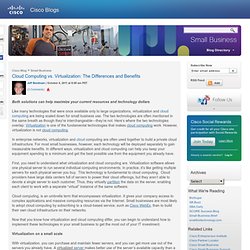
The two technologies are often mentioned in the same breath as though they’re interchangeable—they’re not. Here’s where the two technologies overlap: Virtualization is one of the fundamental technologies that makes cloud computing work. However, virtualization is not cloud computing. In enterprise networks, virtualization and cloud computing are often used together to build a private cloud infrastructure. What cloud computing really means.
Cloud computing is all the rage.
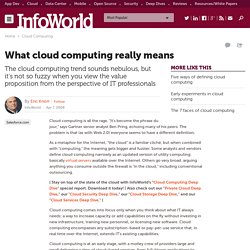
"It's become the phrase du jour," says Gartner senior analyst Ben Pring, echoing many of his peers. The problem is that (as with Web 2.0) everyone seems to have a different definition. As a metaphor for the Internet, "the cloud" is a familiar cliché, but when combined with "computing," the meaning gets bigger and fuzzier. Some analysts and vendors define cloud computing narrowly as an updated version of utility computing: basically virtual servers available over the Internet. Others go very broad, arguing anything you consume outside the firewall is "in the cloud," including conventional outsourcing. [ Stay on top of the state of the cloud with InfoWorld's "Cloud Computing Deep Dive" special report.
Cloud computing comes into focus only when you think about what IT always needs: a way to increase capacity or add capabilities on the fly without investing in new infrastructure, training new personnel, or licensing new software. 1. 2. Cloud storage. Cloud storage is a model of networked enterprise storage where data is stored in virtualized pools of storage which are generally hosted by third parties.
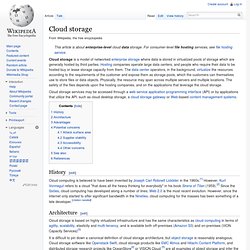
Hosting companies operate large data centers, and people who require their data to be hosted buy or lease storage capacity from them. The data center operators, in the background, virtualize the resources according to the requirements of the customer and expose them as storage pools, which the customers can themselves use to store files or data objects. Physically, the resource may span across multiple servers and multiple locations. The safety of the files depends upon the hosting companies, and on the applications that leverage the cloud storage.
Cloud storage services may be accessed through a web service application programming interface (API) or by applications that utilize the API, such as cloud desktop storage, a cloud storage gateway or Web-based content management systems. History[edit] Cloud computing. Cloud computing metaphor: For a user, the network elements representing the provider-rendered services are invisible, as if obscured by a cloud.

Cloud computing is a computing term or metaphor that evolved in the late 1990s, based on utility and consumption of computer resources. Cloud computing involves application systems which are executed within the cloud and operated through internet enabled devices. Purely cloud computing does not rely on the use of cloud storage as it will be removed upon users download action. Clouds can be classified as public, private and hybrid.[1][2] Overview[edit] Cloud computing[3] relies on sharing of resources to achieve coherence and economies of scale, similar to a utility (like the electricity grid) over a network.[2] At the foundation of cloud computing is the broader concept of converged infrastructure and shared services. HowStuffWorks "How Cloud Computing Works"
Let's say you're an executive at a large corporation.
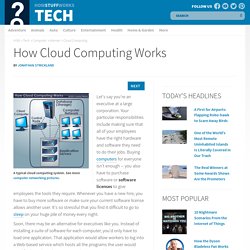
Your particular responsibilities include making sure that all of your employees have the right hardware and software they need to do their jobs. Buying computers for everyone isn't enough -- you also have to purchase software or software licenses to give employees the tools they require. Whenever you have a new hire, you have to buy more software or make sure your current software license allows another user. It's so stressful that you find it difficult to go to sleep on your huge pile of money every night. Soon, there may be an alternative for executives like you. In a cloud computing system, there's a significant workload shift. The Best Cloud Storage Solutions. With nearly ubiquitous Internet connectivity these days, there's no reason you shouldn't have access to all your important documents not only via your PC at your desk at work, but also from your smartphone on the train home, from your tablet on your couch, and from the laptop in your hotel room or kitchen.
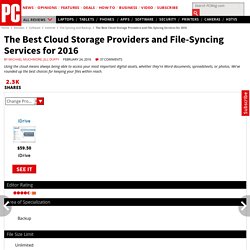
Cloud-based storage and syncing services can make seamless your access to Word docs, PDFs, spreadsheets, photos, any other digital assets—no more emailing files to yourself or plugging and unplugging USB thumb drives. We've rounded up the best of these services to help you decide which you should use. With these services, all your files are always accessible and in their most up-to-date state.
If you don't yet have a service for storing and syncing your data in the cloud, you need one. Which one you choose depends on the kinds of files you store, how much security you need, whether you plan to collaborate with other people, and which devices you use to edit and access your files. What Is Cloud Computing? "What's the cloud?
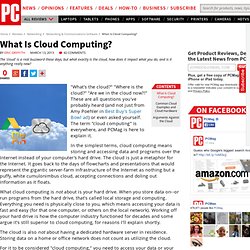
"